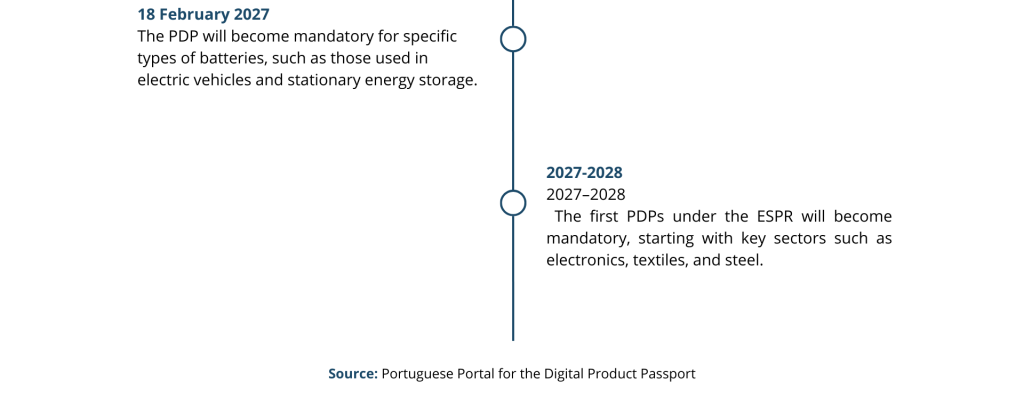The European economy is about to undergo a deep and quiet transformation.
Imagine a product that, by simply scanning a QR code with your smartphone, reveals everything: the materials it’s made of, whether it can be repaired, how it should be recycled, if it complies with safety regulations, and even the name of the manufacturer.
That is the Digital Product Passport (DPP) — a digital identity card that will be mandatory for several products sold in the European Union, with phased implementation starting in 2026. Introduced under the Regulation on Ecodesign for Sustainable Products (ESPR – 2024/1781), the DPP is a cornerstone of the EU’s strategy to shift towards a more circular, resilient, and sustainable economy.
Its goal is ambitious: to extend product lifespans, improve resource efficiency, reduce waste, and empower consumers, investors, and economic operators to make informed decisions.
The DPP represents a strategic shift in how Europe intends to structure its internal market: with more transparency, better traceability, and broader access to product data across global value chains.
This transformation will begin in sectors with the highest environmental impact and the greatest circularity potential, according to the European Commission.
Among the product categories included in the initial phases are: iron, steel, and aluminum; textiles (clothing and footwear); furniture (including mattresses); tires; detergents, paints, and lubricants; chemicals; electronics and ICT devices. More than a legal requirement, the DPP is a strategic instrument to strengthen the competitiveness of European companies.
These products will be the first to incorporate a digital passport with standardized and verifiable data, accessible via digital interfaces such as QR codes.
The implementation will be phased, with specific deadlines for each product category. The table below summarizes the adoption plan defined by the European Commission:


Rather than being merely a regulatory imposition, the DPP represents a strategic reorganization of the European market.
The commitment to transparency, traceability, and digital information positions Europe as a pioneer in environmental regulation with industrial impact.
By standardizing sustainability data, the DPP paves the way for new circular business models — including leasing, remanufacturing, repair, and reuse — and improves communication with both increasingly conscious consumers and institutional investors focused on ESG (Environmental, Social and Governance) criteria.
Scientific evidence shows that companies integrating ecodesign practices, product traceability, and digital lifecycle management can reduce operational costs, adapt more quickly to regulation, and build stronger customer trust.
Recent studies also highlight that anticipating regulatory trends like the DPP accelerates product innovation and attracts higher-value market segments. The competitive advantage lies not only in compliance, but in leading its implementation.
However, the widespread rollout of the DPP brings significant challenges.
The first is technological: how can we ensure that information systems are interoperable, secure, and accessible across the entire value chain?
The second is organizational: many SMEs still lack the digital capabilities, human resources, or quality systems needed to meet these requirements.
The third is geopolitical: by centralizing data in common digital infrastructures, Europe asserts its technological sovereignty — but also risks creating asymmetries between companies with differing levels of digital maturity.
On the other hand, the rise of the DPP is creating a new market for technological solutions and support services for sustainable transition. From lifecycle management platforms to blockchain-based traceability software, a new wave of startups and service providers is emerging in this ecosystem. For these actors, the DPP is an opportunity to strengthen their position in European and global markets.
The impact of the Digital Product Passport goes beyond technical requirements. It introduces a product data economy, where access to verified information becomes a precondition for market participation.
Those who define the standards, digital architecture, and interoperability protocols will shape the rules of competition in the coming years. In this sense, the DPP is also an instrument of economic diplomacy and a vehicle for asserting Europe’s role as a global regulatory leader.
Portuguese and European companies must not see the DPP as mere bureaucracy. It is a new market language, and those who fail to speak it risk being excluded from high-performance supply chains and public procurement contracts in the EU.
Forward-looking business leaders are already mapping their product information flows, training technical teams, and building alliances with technology partners. The rest will have to catch up — fast.
The future will be digital, circular, and transparent.
The Digital Product Passport is not the end — it is the beginning of a new era in which sustainability becomes measurable, traceable, and verifiable.
An era where data is as valuable as material resources.
And where the companies that can anticipate this reality will secure strategic positions in the global market.
Excerpt written by Beatriz Santos
*Cover Photo by Mitya Ivanov on Unsplash



